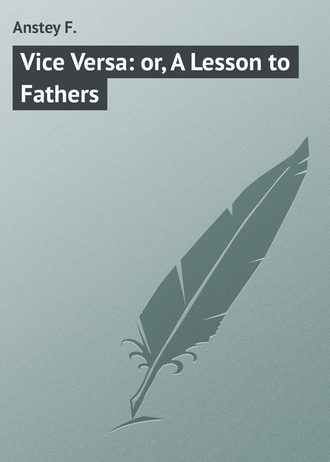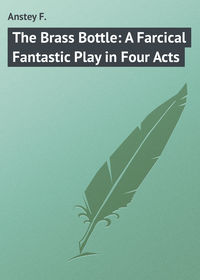 полная версия
полная версияVice Versa: or, A Lesson to Fathers
"The visitors' bell!" cried Paul, roused from his apathy; and he rushed to the window which commanded a side-view of the portico; it might be only a servant calling for one of the children, but he feared the worst, and could not rest till he knew it.
It was a rash thing to do, for as he drew the blind, he saw a large person in a heavy Inverness cloak standing on the steps, and (which was worse) the person both saw and recognised him!
With fascinated horror, Mr. Bultitude saw the Doctor's small grey eyes fixed angrily on him, and knew that he was hunted down at last.
He turned to the other two with a sort of ghastly composure: "It's all over now," he said. "I've just seen Dr. Grimstone standing on my doorstep; he has come after me."
Uncle Marmaduke gave a malicious little laugh: "I'm sorry for you, my friend," he said, "but I really can't help it."
"You can," said Paul; "you can tell him what you know. You can save me."
"Very poor economy that," said Marmaduke airily. "I prefer spending to saving, always did. I have my own interests to consider, my dear Paul."
"Dick," said poor Mr. Bultitude, disgusted at this exhibition of selfishness, "you said you were sorry just now. Will you tell him the truth?"
But Dick was quite unnerved, he cowered away, almost crying; "I daren't, I daren't," he stammered; "I – I can't go back to the fellows like this. I'm afraid to tell him. I – I want to hide somewhere."
And certainly he was in no condition to convince an angry schoolmaster of anything whatever, except that he was in a state very unbecoming to the head of a family.
It was all over; Paul saw that too well, he dashed frantically from the fatal billiard-room, and in the hall met Boaler preparing to admit the visitor.
"Don't open the door!" he screamed. "Keep him out, you mustn't let him in. It's Dr. Grimstone."
Boaler, surprised as he naturally was at his young master's unaccountable appearance and evident panic, nevertheless never moved a muscle of his face; he was one of those perfectly bred servants, who, if they chanced to open the door to a ghoul or a skeleton, would merely inquire, "What name, if you please?"
"I must go and ask your Par, then, Master Dick; there's time to 'ook it upstairs while I'm gone. I won't say nothing," he added compassionately.
Paul lost no time in following this suggestion, but rushed upstairs, two or three steps at the time, stumbling at every flight, with a hideous nightmare feeling that some invisible thing behind was trying to trip up his heels.
He rushed blindly past the conservatory, which was lit up by Chinese lanterns and crowded with little "Kate Greenaway" maidens crowned with fantastic headdresses out of the crackers, and comparing presents with boy-lovers; he upset perspiring waiters with glasses and trays, and scattered the children sitting on the stairs, as he bounded on in his reckless flight, leaving crashes of glass behind him.
He had no clear idea of what he meant to do; he thought of barricading himself in his bedroom and hiding in the wardrobe; he had desperate notions of getting on to the housetop by means of a step-ladder and the sky-light above the nursery landing; on one point he was resolved – he would not be retaken alive!
Never before in this commonplace London world of ours was an unfortunate householder hunted up his own staircase in this distressing manner; even his terror did not blind him to the extreme ignominy and injustice of his position.
And below he heard the bell ringing more and more impatiently, as the Doctor still remained on the wrong side of the door. In another minute he must be admitted – and then!
Who will not sympathise with Mr. Bultitude as he approaches the crisis of his misfortunes? I protest, for my own part, that as I am compelled to describe him springing from step to step in wild terror, like a highly respectable chamois before some Alpine marksman, my own heart bleeds for him, and I hasten to end my distressing tale, and make the rest of it as little painful as I may with honesty.
19. The Reckoning
Montr. The father is victorious.
Belf. Let us haste
To gratulate his conquest.
1st Capt. We to mourn
The fortune of the son.
Massinger. The Unnatural Combat.Poor Mr. Bultitude, springing wildly upstairs in a last desperate effort to avoid capture, had now almost reached his goal. Just above him was the nursery landing, with its little wooden gate, and near it, leaning against the wall, was a pair of kitchen steps, with which he had hopes of reaching the roof, or the cistern loft, or some other safe and inaccessible place. Better a night spent on the slates amongst the chimney-pots than a bed in that terrible No. 6 Dormitory!
But here, too, fate was against him. He was not more than half-a-dozen steps from the top, when, to his unspeakable horror, he saw a small form in a white frock and cardinal-red sash come running out of the nursery, and begin to descend slowly and cautiously, clinging to the banisters with one chubby little hand.
It was his youngest son, Roly, and as soon as he saw this, he lost hope once and for all; he could not escape being recognised, the child would probably refuse to leave him, and even if he did contrive to get away from him, it would be hopeless to make Roly understand that he was not to betray his hiding-place.
So he stopped on the stairs, aghast at this new misfortune, and feeling himself at the end of all his resources. Roly knew him at once, and began to dance delightedly up and down on the stair in his little bronze shoes. "Buzzer Dicky," he cried, "dear buzzer Dicky, tum 'ome to party!"
"It's not brother Dicky," said Paul miserably; "it's all a mistake."
"Oh, but it is though," said Roly; "and you don't know what Roly's found."
"No, no," said Paul, trying to pass (which, as Roly persisted in leaping joyously from side to side of the narrow stair, was difficult); "you shall show me another time. I'm in a hurry, my boy, I've got an appointment."
"Roly's got something better than that," observed the child.
Mr. Bultitude, in spite of his terror, was too much afraid of hurting him by brushing roughly past to attempt such a thing, so he tried diplomacy. "Well, what has Roly found – a cracker?"
"No, no, better than a cwacker – you guess."
"I can't guess," said Paul; "never mind, I don't want to know."
"Well then," said Roly, "there." And he slowly unclosed a fat little fist, and in it Paul saw, with a revulsion of feeling that turned him dizzy and faint, the priceless talisman itself, the identical Garudâ Stone, with part of the frail gilt ring still attached to it.
The fastening had probably given way during Master Dick's uproarious revels in the drawing-room, and Roly must have picked it up on the carpet shortly afterwards.
"Isn't it a pitty sing?" said Roly, insisting that his treasure should be duly admired.
"A very pretty thing," said his father, hoarse and panting; "but it's mine, Roly, it's mine!"
And he tried to snatch it, but Roly closed his fist over it and pouted, "It isn't yours," he said, "it's Roly's. Roly found it."
Paul's fears rose again; would he be wrecked in port after all? His ear, unnaturally strained, caught the sound of the front door being opened, he heard the Doctor's deep voice booming faintly below, then the noise of persons ascending.
"Roly shall have it, then," he said perfidiously, "if he will say after me what I tell him. Say, 'I wish Papa and Brother Dick back as they were before,' Roly."
"Ith it a game?" asked Roly, his face clearing and evidently delighted with his eccentric brother Dick, who had run all the way home from school to play games with him on the staircase.
"No – yes!" cried Paul, "it's a very funny game; only do what I tell you. Now say, 'I wish Papa and Brother Dick back again as they were before.' I'll give you a sugar-plum if you say it nicely."
"What sort of sugar-plum?" demanded Roly, who inherited business instincts.
"Any sort you like best!" almost shrieked Paul; "oh, do get on!"
"Lots of sugar-plums, then. 'I with' – I forget what you told me – oh, 'I with Papa and – ' there'th thomebody tummin' upsthairs!" he broke off suddenly; "it'h nurth tummin' to put me to bed. I don't want to go to bed yet."
"And you shan't go to bed!" cried Paul, for he too thought he heard some one. "Never mind nurse, finish the – the game."
– 'Papa and Buzzy Dicky back again as – as they were before,' repeated Roly at last. "What a funny – ow, ow, it'h Papa! it'h Papa! and he told me it wath Dicky. I'm afwaid! Whereth Dicky gone to? I want Bab, take me to Bab!"
For the Stone had done its work once more, and this time with happier results; with a supreme relief and joy, which no one who has read this book can fail to understand, Mr. Bultitude felt that he actually was his old self again.
Just when all hope seemed cut off and relief was most unlikely, the magic spell that had caused him such intolerable misery for one hideous week was reversed by the hand of his innocent child.
He caught Roly up in his arms and kissed him as he had never been kissed in his whole life before, at least by his father, and comforting him as well as he could, for the poor child had naturally received rather a severe shock, he stepped airily down the staircase, which he had mounted with such different emotions five minutes before.
On his way he could not resist going into his dressing-room and assuring himself by a prolonged examination before the cheval-glass that the Stone had not played him some last piece of jugglery; but he found everything quite correct; he was the same formal, precise and portly person, wearing the same morning dress even as on that other Monday evening, and he went on with greater confidence.
He took care, however, to stop at the first window, when he managed, after some coaxing, to persuade Roly to give up the Garudâ Stone. As soon as he had it in his hands again, he opened the window wide and flung the dangerous talisman far out into the darkness. Not till then did he feel perfectly secure.
He passed the groups of little guests gathered about the conservatory, and lower down he met Boaler, the nurse, and one or two servants and waiters, rushing up in a state of great anxiety and flurry; even Boaler's usual composure seemed shaken. "Please, sir," he asked, "the schoolmaster gentleman, Master Dick – he've run upstairs, haven't you seen him?"
Paul had almost forgotten Dick in his new happiness; there would be a heavy score to settle with him; he had the upper hand once more, and yet, somehow, he did not feel as much righteous wrath and desire for revenge as he expected to do.
"Don't be alarmed," he said, waving them back with more benignity than he thought he had in him. "Master Dick is safe enough. I know all about it. Where is Dr. Grimstone? In the library, eh? Very well, I will see him there."
And leaving Roly with the nurse, he went down to the library; not, if the truth must be told, without a slight degree of nervousness, unreasonable and unaccountable enough now, but quite beyond his power to control.
He entered the room, and there, surrounded by piles of ticketed hats and coats, under the pale light of one gas-burner, he saw the terrible man before whom he had trembled for the last seven horrible days.
A feeling of self-defence made Paul assume rather more than his old stiffness as he shook hands. "I am very glad to see you, Dr. Grimstone," he said, "but your coming at this time forces me to ask if there is any unusual reason for, for my having the – a – pleasure of seeing you here?"
"I am exceedingly distressed to have to say that there is," said the Doctor solemnly, "or I should not have troubled you at this hour. Try to compose yourself, my dear sir, to bear this blow."
"I will," said Paul, "I will try."
"The fact is then, and I know how sad a story it must be for a parent's ear, but the fact is, that your unhappy boy has had the inconceivable rashness to quit my roof." And the Doctor paused to watch the effect of his announcement.
"God bless my soul!" cried Paul. "You don't say so!"
"I do indeed; he has, in short, run away. But don't be alarmed, my dear Mr. Bultitude, I think I can assure you he is quite safe at the present moment" ("Thank Heaven, he is!" thought Paul, thinking of his own marvellous escape). "I should certainly have recaptured him before he could have left the railway station, where he seems to have gone at once, only, acting on information (which I strongly suspect now was intentionally misleading), I drove on to the station on the up-line, thinking to find him there. He was not there, sir, I believe he never went there at all; but, guessing how matters were, I searched the train, carriage by carriage, compartment by compartment, when it came up."
"I am very sorry you should have had so much trouble," said Paul, with a vivid recollection of the exploring stick; "and so you found him?"
"No, sir," said the Doctor passionately, "I did not find him, but he was there; he must have been there! but the shameless connivance of two excessively ill-bred persons, who positively refused to allow me access to their compartment, caused him to slip through my fingers."
Mr. Bultitude observed, rather ungratefully, that, if this was so, it was a most improper thing for them to do.
"It was, indeed, but it is of no consequence fortunately. I was forced to wait for the next train, but that was not a very slow one, and so I was able to come on here before a very late hour and acquaint you with what had taken place."
"Thank you very much," said Paul.
"It's a painful thing to occur in a school," observed the Doctor after a pause.
"Most unfortunate," agreed Paul, coughing.
"So apt to lead persons who are not acquainted with the facts to imagine that the boy was unhappy under my care," continued the Doctor.
"In this case, I assure you, I have no doubts," protested Paul with politeness and (seldom a possible combination) perfect truth.
"Very kind of you to say so; really, it's a great mystery to me. I certainly, as I felt it my duty to inform you at the time, came very near inflicting corporal punishment upon him this morning – very near. But then he was pardoned on your intercession; and, besides, the boy would never have run away for fear of a flogging."
"Oh, no, perfectly absurd!" agreed Paul again.
"Such a merry, high-spirited lad, too," said the Doctor, sincerely enough; "popular with his schoolfellows; a favourite (in spite of his faults) with his teachers."
"No, was he though?" said Paul with more surprise, for he had not been fortunate enough to reap much vicarious benefit from his son's popularity, as he could not help remembering.
"All this, added to the comforts (or, may I say, the luxuries?) he enjoyed under my supervision, does make it seem very strange and ungrateful in the boy to take this sudden and ill-considered step."
"Very, indeed; but do you know, Dr. Grimstone, I can't help thinking – and pray do not misunderstand me if I speak plainly – that, perhaps, he had reasons for being unhappy you can have no idea of?"
"He would have found me ready to hear any complaints and prompt to redress them, sir," said the Doctor. "But, now I think of it, he certainly did appear to have something on his mind which he wished to tell me; but his manner was so strange and he so persistently refused to come to the point, that I was forced to discourage him at last."
"You did discourage him, indeed!" said Paul inwardly, thinking of those attempted confidences with a shudder. "Perhaps some of his schoolfellows may have – eh?" he said aloud.
"My dear sir," exclaimed the Doctor, "quite out of the question!"
"Do you think so?" said Paul, not being able to resist the suggestion. "And yet, do you know, some of them did not appear to me to look very – very good-natured, now."
"A more manly, pleasant, and gentlemanly set of youths never breathed!" said the Doctor, taking up the cudgels for his boys, and, to do him justice, probably with full measure of belief in his statement. "Curious now that they should have struck you so differently!"
"They certainly did strike me very differently," said Paul. "But I may be mistaken."
"You are, my dear sir. And, pardon me, but you had no opportunity of testing your opinion."
"Oh, pardon me," retorted Paul grimly, "I had indeed!"
"A cursory visit," said the Doctor, "a formal inspection – you cannot fairly judge boys by that. They will naturally be reserved and constrained in the presence of an elder. But you should observe them without their knowledge – you want to know them, my dear Mr. Bultitude, you want to go among them!"
It was the very last thing Paul did want – he knew them quite well enough, but it was of no use to say so, and he merely assented politely.
"And now," said the Doctor, "with regard to your misguided boy. I have to tell you that he is here, in this very house. I tracked him here, and, ten minutes ago, saw him with my own eyes at one of your windows.
"Here!" cried Paul, with a well-executed start; "you astonish me!"
"It has occurred to me within the last minute," said the Doctor, "that there may be a very simple explanation of his flight. I observe you are giving a – a juvenile entertainment on a large scale."
"I suppose I am," Paul admitted. "And so you think – ?"
"I think that your son, who doubtless knew of your intention, was hurt at being excluded from the festivities and, in a fit of mad wilful folly, resolved to be present at them in spite of you."
"My dear Doctor," cried Paul, who saw the conveniences of this theory, "that must be it, of course – that explains it all!"
"So grave an act of insubordination," said the Doctor, "an act of double disobedience – to your authority and mine – deserves the fullest punishment. You agree with me, I trust?"
The memory of his wrongs overcame Mr. Bultitude for the moment: "Nothing can be too bad for the little scoundrel!" he said, between his teeth.
"He shall have it, sir, I swear to you; he shall be made to repent this as long as he lives. This insult to me (and of course to you also) shall be amply atoned for. If you will have the goodness to deliver him over to my hands, I will carry him back at once to Market Rodwell, and to-morrow, sir, to-morrow, I will endeavour to awaken his conscience in a way he will remember!"
The Doctor was more angry than an impartial lover of justice might perhaps approve of, but then it must be remembered that he had seen himself completely outwitted and his authority set at nought in a very humiliating fashion.
However, his excessive wrath cooled Paul's own resentment instead of inflaming it; it made him reflect that, after all, it was he who had the best right to be angry.
"Well," he said, rather coldly, "we must find him first, and then consider what shall be done to him. If you will allow me I will ring and – "
But before he could lay his hand upon the bell the library door opened, and Uncle Marmaduke made his appearance, dragging with him the unwilling Dick: the unfortunate boy was effectually sobered now, pale and trembling and besmirched with coal-dust – in fact, in very much the same plight as his ill-used father had been in only three hours ago.
There was a brazen smile of triumph on Mr. Paradine's face as he met Paul's eyes with a knowing wink, which the latter did not at all understand.
Such audacity astonished him, for he could hardly believe that Paradine, after his perfidious conduct in the billiard-room, could have the clumsy impudence to try to propitiate him now.
"Here he is, my boy," shouted Paradine; "here's the scamp who has given us all this trouble! He came into the billiard-room just now and told me who he was, but I would have nothing to do with him of course. Not my business, as I told him at the time. Then – (I think I have the pleasure of seeing Dr. Grimstone? just so) well, then you, sir, arrived – and he made himself scarce. But when I saw him in the act of making a bolt up the area, where he had been taking shelter apparently in the coal-cellar, I thought it was time to interfere, and so I collared him. I have much pleasure in handing him over now to the proper authorities."
And, letting Dick go, he advanced towards his brother-in-law, still with the same odd expression of having a secret understanding with him, which made Paul's blood boil.
"Stand where you are, sir," said Paul to his son. "No, Dr. Grimstone, allow me – leave him to me for the present, please."
"That's much better," whispered Paradine approvingly; "capital. Keep it up, my boy; keep it up! Papa's as quiet as a lamb now. Go on."
Then Paul understood; his worthy brother-in-law had not been present at the last transformation and was under a slight misapprehension: he evidently imagined that he had by this last stroke made himself and Dick masters of the situation – it was time to undeceive him.
"Have the goodness to leave my house at once, will you!" he said sternly.
"You young fool!" said Marmaduke, under his breath, "after all I have done for you, too! Is this your gratitude? You know you can't get on without me. Take care what you're about!"
"If you can't see that the tables are turned at last," said Paul slowly, "you're a duller knave than I take you to be."
Marmaduke started back with an oath: "It's a trick," he said savagely; "you want to get rid of me."
"I certainly intend to," said Paul. "Are you satisfied? Do you want proofs – shall I give them – I did just now in the billiard-room?"
Paradine went to Dick and shook him angrily: "You young idiot!" he said, in a furious aside, "why didn't you tell me? What did you let me make a fool of myself like this for, eh?"
"I did tell you," muttered Dick, "only you wouldn't listen. It just serves you right!"
Marmaduke soon collected himself after this unexpected shock; he tried to shake Paul's hands with an airy geniality. "Only my little joke," he said, laughing; "ha, ha, I thought I should take you in!.. Why, I knew it directly… I've been working for you all the time – but it wouldn't have done to let you see my line."
"No," said Paul; "it was not a very straight one, as usual."
"Well," said Marmaduke, "I shouldn't have stopped Master Dick there if I hadn't been on your side, should I now? I knew you'd come out of it all right, but I had a difficult game to play, don't you know? I don't wonder that you didn't follow me just at first."
"You've lost your game," said Paul; "it's no use to say any more. So now, perhaps, you'll go?"
"Go, eh?" said Paradine, without showing much surprise at the failure of so very forlorn a hope, "oh, very well, just as you please, of course. Let your poor wife's only brother go from your doors without a penny in the world! – but I warn you that a trifle or so laid out in stopping my mouth would not be thrown away. Some editors would be glad enough of a sensation from real life just now, and I could tell some very odd tales about this little affair!"
"Tell them, if a character for sanity is of no further use to you," said Paul. "Tell them to anyone you can get to believe you – tell the crossing-sweeper and the policemen, tell your grandmother, tell the horse-marines – it will amuse them. Only, you shall tell them on the other side of my front door. Shall I call anyone to show you out?"
Paradine saw his game was really played out, and swaggered insolently to the door: "Not on my account, I beg," he said. "Good-bye, Paul, my boy, no more dissolving views. Good-bye, my young friend Richard, it was good fun while it lasted, eh? like the Servian crown – always a pleasant reminiscence! Good evening to you, Doctor. By the way, for educational purposes let me recommend a 'Penang lawyer' – buy one as you go back for the boys – just to show them you haven't forgotten them!"
And, having little luggage to impede him, the front door closed upon him shortly afterwards – this time for ever.
When he had gone, Dick looked imploringly at his father and then at the Doctor, who, until Paradine's parting words had lashed him into fury again, had been examining the engravings on the walls with a studied delicacy during the recent painful scene, and was now leaning against the chimney-piece with his arms folded and a sepulchral gloom on his brow.









